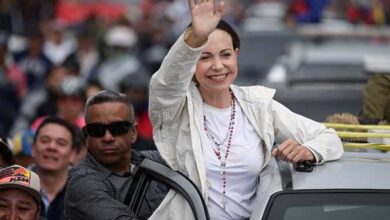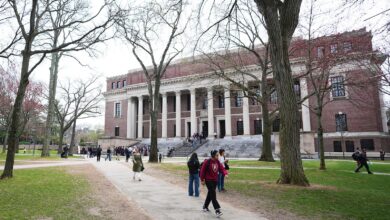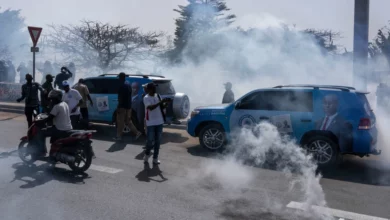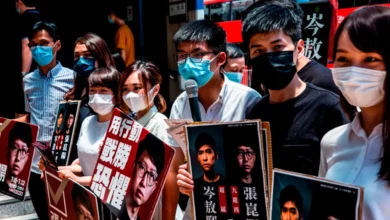Washington DC–On May Day, Egyptians in America voted for the first time ever in a free and fair electoral process that included Hamdeen Sabahi, Mohamed ElBaradei, Ayman Nour, Amr Moussa and Gamal Mubarak as candidates.
The voting, which took place in front of the Egyptian embassy in the US capital, was part of a mock presidential election staged amid a demonstration–organized by the Egyptian Association for Change-US–demanding the constitutional right of Egyptians abroad to vote in upcoming elections.
Protesters held Egyptian flags and lined up to cast their mock votes to demonstrate their demand for free and fair elections in Egypt. They gathered in front of their embassy demanding constitutional changes that guarantee their right to vote in a democratic electoral process and an end to the state of emergency in Egypt that has been in force for almost thirty years.
The protests were triggered by Mohamed ElBaradei’s recent mobilization for political reform in Egypt. However, the former head of the UN International Atomic Energy Agency was not the only candidate on the ballot, though many protesters consider him a symbol of change.
Zaid Saleh, a New York-based engineer and a member of the association, explained that it is a non-profit group, consisting mostly of young people who are not officially affiliated with any political parties. Saleh, who was never involved in political activism before, said that he was motivated by ElBaradei’s actions in Egypt.
“He made me feel that change is possible, and that I just need to reach out to make it a reality,” Saleh said, adding that before ElBaradei, other political figures of the opposition such as Ayman Nour and Saad Eddin Ibrahim were engaged in battles with the regime that were not going anywhere.
Despite the fact that most of the Egyptian protestors did not affiliate with any political figures or organizations, the main speakers were Saad Eddin Ibrahim of the Ibn Khaldun Center for Development Studies and Ahmed Subhy Mansour of the Quranists.
“Ibrahim attended the demonstration in his capacity as an Egyptian citizen,” Saleh said. “I made sure when I joined the association that we start as a clean slate, not affected by other political figures’ careers.”
The demonstrators were in fact a diverse lot of young professionals, either Egyptian-Americans, or Egyptians studying in the US. They might not have been the ones dominating the podiums and microphones, but they had a bigger goal: demanding their right to participate in a free and fair Egyptian electoral process by voting in fake elections.
Dr. Khaled el-Shamy, a physician at the Lombardi Cancer Center in Washington, DC, migrated to America from Alexandria 11 years ago. “ I am here to participate in an effort to bring down a regime that stripped Egypt of its resources and status,” he said.
El-Shamy voted for ElBaradei, “because he caused a political fervor that puts pressure on the current regime in Egypt.”
“I admire others, like Hamdeen Sabahi,” el-Shamy added, “but we need to unify our voice.” El-Shamy, like most voting protesters never voted in Egyptian elections before. “And I was never really interested in doing so.”
Samer Sadeq, a programmer who came to the US in 1997 said he doesn’t even even know anyone who has voted in the past. In the mock election however, Sadeq voted for Hamdeen Sabahi. “I have been following Sabahi’s political career and I am impressed by his writings and political views.”
Analyzing the demonstration from Ohio where she is a professor, Zeinab Abul-Magd was pleasantly surprised that Hamdeen Sabahi was present in the mock presidential race. “Sabahi is not very visible in the media, and people who still support him are probably the generation that went to Cairo University in the 1980s and could remember his activism in speaking for peasants and workers’ rights against Sadat’s open door policy,” she said.
The mock elections illustrated the thirst of Egyptians in the US to participate in their country’s political process. They might have rallied around ElBaradei as a symbol, but they also expressed their diversity and their connection to other political figures in Egypt.
The voting protesters, regardless of their association and age, were eager to embrace their candidate of choice. Hanna al-Khattab, a senior at the University of Maryland who came to the US four years ago, joined the demonstration, insisting that “30 years of Mubarak’s rule is enough.”
Hanna was not yet 18 years old during the last presidential elections in 2005, but she expressed her opposition towards the regime, saying that her sister voted for Ayman Nour last time. “I am here to support ElBaradei and change,” she said.
It is unclear whether Hanna will be able to vote for her presidential candidate in the real elections of 2011. But she came to demand this right. There were even younger protestors whose parents brought them to the demonstration in strollers, hoping that one day their children could freely and fairly cast their votes in real Egyptian ballots boxes.
“We are here to support all possible presidential candidates,” one of the main organizers, who chose to remain anonymous, explained. “We are staging this mock election to illustrate that there are no organizational or logistical obstacles that are preventing this dream of free and fair elections from becoming a reality. People have showed their will to participate, and the real obstacle is the viciousness of the current Egyptian regime.”
The organizer, who monitored the 2005 presidential elections in Egypt, spoke of the violations he witnessed at the hands of State Security that prevented the candidates and their supporters from casting their votes, and manipulated the vote-counting process.
Most of the voters insisted that they participated as individuals, distancing themselves from any official organizations. Nevertheless, the demonstration was dominated by speeches of political figures like Saad Eddin Ibrahim and Ahmed Soubhy Mansour.
Mansour voiced his objection to the Egyptian regime and its state of emergency, while Ibrahim used the United States as a model for freedom and diversity to be emulated. Indeed, the level of freedom in the US was on many people’s minds, particularly in light of the expulsion of ElBaradei supporters in Kuwait last month, an event that angered Egyptians in America and elsewhere.
Nevertheless, while Ibrahim was making those statements, May Day demonstrations were visible nearby, as other protesters demonstrated against the treatment of immigrants.
Not far from the Egyptian embassy, thousands of Latino Americans protested in front of the White House, and across America, against anti-immigrant laws that open the door to racial profiling. The immigration activists were particularly angered by the latest immigration law passed in Arizona that gives police officers license to question the status of anyone suspected of being an undocumented immigrant. Those immigrants are usually Latino workers, who have consistently used May Day to voice their protest against the discrimination they face at the hands of the US government.
Unlike Ibrahim’s statement that perceived America as a haven of freedom, Egyptian immigrants are still struggling and are threatened with racial profiling at any moment. The Egyptian demonstration on 1 May attached itself to the political activism of this significant day.
Nadine Abdel Wahab, an Egyptian NGO worker who migrated to the US in 1987, spoke to the significance of the May Day for the Egyptian diaspora. “As we look at May Day, we realize that it is an occasion for voicing the struggle of all immigrants in America. Our rights, as Egyptian expats, to vote in our country of origin’s elections is an extension of this struggle,” she said.




